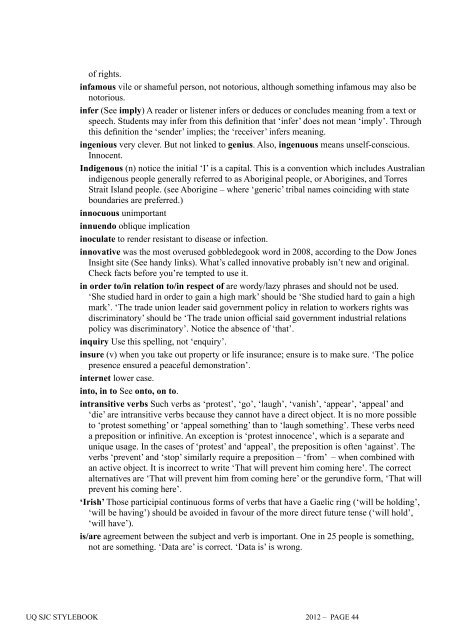of rights.infamous vile or shameful person, not notorious, although something infamous may also benotorious.infer (See imply) A reader or listener infers or deduces or concludes meaning from a text orspeech. Students may infer from this definition that ‘infer’ does not mean ‘imply’. Throughthis definition the ‘sender’ implies; the ‘receiver’ infers meaning.ingenious very clever. But not linked to genius. Also, ingenuous means unself-conscious.Innocent.Indigenous (n) notice the initial ‘I’ is a capital. This is a convention which includes Australianindigenous people generally referred to as Aboriginal people, or Aborigines, <strong>and</strong> TorresStrait Isl<strong>and</strong> people. (see Aborigine – where ‘generic’ tribal names coinciding with stateboundaries are preferred.)innocuous unimportantinnuendo oblique implicationinoculate to render resistant to disease or infection.innovative was the most overused gobbledegook word in 2008, according to the Dow JonesInsight site (See h<strong>and</strong>y links). What’s called innovative probably isn’t new <strong>and</strong> original.Check facts before you’re tempted to use it.in order to/in relation to/in respect of are wordy/lazy phrases <strong>and</strong> should not be used.‘She studied hard in order to gain a high mark’ should be ‘She studied hard to gain a highmark’. ‘The trade union leader said government policy in relation to workers rights wasdiscriminatory’ should be ‘The trade union official said government industrial relationspolicy was discriminatory’. Notice the absence of ‘that’.inquiry Use this spelling, not ‘enquiry’.insure (v) when you take out property or life insurance; ensure is to make sure. ‘The policepresence ensured a peaceful demonstration’.internet lower case.into, in to See onto, on to.intransitive verbs Such verbs as ‘protest’, ‘go’, ‘laugh’, ‘vanish’, ‘appear’, ‘appeal’ <strong>and</strong>‘die’ are intransitive verbs because they cannot have a direct object. It is no more possibleto ‘protest something’ or ‘appeal something’ than to ‘laugh something’. These verbs needa preposition or infinitive. An exception is ‘protest innocence’, which is a separate <strong>and</strong>unique usage. In the cases of ‘protest’ <strong>and</strong> ‘appeal’, the preposition is often ‘against’. Theverbs ‘prevent’ <strong>and</strong> ‘stop’ similarly require a preposition – ‘from’ – when combined withan active object. It is incorrect to write ‘That will prevent him coming here’. The correctalternatives are ‘That will prevent him from coming here’ or the gerundive form, ‘That willprevent his coming here’.‘Irish’ Those participial continuous forms of verbs that have a Gaelic ring (‘will be holding’,‘will be having’) should be avoided in favour of the more direct future tense (‘will hold’,‘will have’).is/are agreement between the subject <strong>and</strong> verb is important. One in 25 people is something,not are something. ‘Data are’ is correct. ‘Data is’ is wrong.UQ <strong>SJC</strong> STYLEBOOK <strong>2012</strong> – PAGE 44
Islamic <strong>and</strong> Islamist are often confused. The former relates to Islam; the latter to Islamicmilitancy <strong>and</strong> fundamentalism. So it is not ‘Islamic terrorists’ but ‘Islamist terrorists.-ise/-ize endings Although dictionaries have tended to favour ‘-ize’ endings to verbs, with ‘-ise’as an alternative, news <strong>style</strong> is to favour ‘-ise’ endings. Kahn (1985: 306) points out that veryfew verbs take only ‘-ize’ endings. They include ‘capsize’, ‘prize’, ‘seize’ <strong>and</strong> ‘size’. Manyhundreds more verbs take only the ‘-ise’ ending — ‘advertise’, ‘advise’, ‘apprise’, ‘comprise’,‘devise’, ‘disguise’, ‘exercise’, ‘improvise’, ‘promise’, ‘poise’, ‘raise’, ‘revise’, ‘supervise’,‘surprise’, ‘televise’. Using the ‘-ise’ ending is much less likely to be incorrect. This usageextends to noun construction with ‘-ation’, adjectives, <strong>and</strong> so on: ‘civilisation’, ‘recognisable’.To avoid the unacceptable use of –ize endings, you can set MSWord to ‘Australian English’through , <strong>and</strong> . The alternative is tomanually amend –ize endings to –ise.it Use this pronoun with care to avoid confusion of meaning. Consider: ‘He shot at the rat withhis revolver <strong>and</strong> it exploded.’ Another dangerous use of ‘it’ is to use it or another pronounearlier in the sentence than the noun to which it refers: ‘Its <strong>style</strong> book is likely to dominate thediscussion at the next meeting of the Journalism Students’ Association of the University ofQueensl<strong>and</strong>’s School of Journalism <strong>and</strong> Communication.’italics (See also accents, cliche <strong>and</strong> foreign words) Titles of newspapers, magazines, films,radio <strong>and</strong> television programs, books, etc. are written in italics (The Australian, 60 Minutes,The Media Report, The Inner Circle). But NOT the names of businesses, organisations, orsports clubs (Channel 7, Friends of the ABC, Brisbane Lions). This applies to businesses,organisations <strong>and</strong> clubs with non-English names (Agence France Presse, Al-Jazeera, Ajax).Words <strong>and</strong> phrases used directly from a language other than English are also italicized.it’s is not possessive. It is the contracted form of ‘it is’. Common mistake. All pronouns alreadyhave a built-in possessive: mine, yours, its, his, hers, theirs. No apostrophe required. (See alsoNews Ltd section).Jjargon Jargon develops rapidly in specialised groups, probably because it improvescommunication within the group. This does not mean anyone outside the group willunderst<strong>and</strong> the jargon. Avoid what is obviously jargon, including the jargon of journalism —although ‘journos’ may refer to ‘pars’, a ‘story’, a ‘byline’, the ‘leader’, the ‘intro’ <strong>and</strong> so on,these terms may not be clearly understood by readers. Unless writing for a specific audience,avoid pop argot, electronic/military ‘buzz’ words (jargon), political/economic cant, ‘artycrafty’obscurity <strong>and</strong> the gobbledegook (more jargon) of much sociological writing.judges sit in the High Court (federal), Federal Court, Supreme courts (states), <strong>and</strong> Family courts(states). Referred to initially by full name: Justice John Smith, <strong>and</strong> subsequently as JusticeSmith. District courts (most states) <strong>and</strong> County Court (Victoria) refer to them as Judge Smith.And …’the judge said,’ not ‘his Honour said …’ Magistrates in courts of petty sessions arenot judges. Initially referred to as Magistrate Joan Smith; thereafter as Ms Smith. A judgeor magistrate is the court effectively. Thus they do not ‘tell the court’ anything. Counsel,witnesses <strong>and</strong> defendants tell the court things.PAGE 45 – <strong>2012</strong>UQ <strong>SJC</strong> STYLEBOOK


